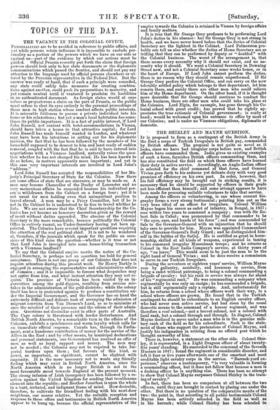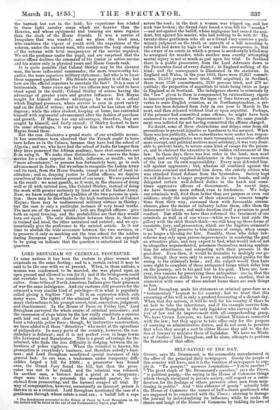• THE SHIRLEY AND MAYNE QUESTION.
Jr is proposed to form as a contingent of the British Army in the East a corps of Turkish Irregulars in British pay, commanded by British officers. The proposal is not quite so novel as it looks, since we have had irregular corps before now, and British officers have commanded them. India gives us existing examples of such a force, furnishes British officers commanding them, and has also constituted the field on which those officers have learned their duty in active service. Accordingly, an Anglo-Indian officer is selected for the chief command of that force, and General Vivian goes forth to his arduous yet delicate duty with very good promises of efficiency on his own part. In order, however, that
his full efficiency may be brought out in striking results, it is necessary that he should be supported by officers in their grade not less efficient than himself; and some attempt appears to have been made for procuring suitable volunteers to take that service.
Among the officers so volunteering, is one whose current bio- graphy forms a very strong testimonial ; pointing him out as the very bean ideal of an officer for irregulars. Colonel William Mayne began his career as cadet of infantry, in Bengal, in 1837; rose within two years to command a company ; wak with Sir Ro- bert Sale in Cabal; was pronounced by that commander to be "the eyes, ears, and hands of his force " ; and was commended by Sale to the Governor-General with an injunction that he should take care to provide for him. Mayne was appointed Commandant of the Governor-General's Body Guard ; and he distinguished him- self in the battles of the Sutlej. He is certified as great in horse- manship, skilled at all kinds of weapons, experienced in taming to his command irregular Mnssulman troops; and he returns as Colonel in the East India Company's service, at thirty years of age, "on leave." This would seem to be just the man to be the right hand of General Vivian ; and he does receive a commission to serve in our Turkish Irregulars. During the seventeen or eighteen years' service, William Mayne rose by gallantry, assiduity, and keenness in service, from being a cadet without patronage, to being a colonel commanding a
brigade of cavalry: but his rank in service was always far ahead of his "regimental rank." He was commanding a company when
regimentally he was only an ensign ; he has commanded a brigade, but is still regimentally only a captain. And, unfortunately fOr him, he returns from a school where officers work their way, to a school where officers are grown. He found that in the Turkish contingent he should be subordinate to an English cavalry officer, who had never seen active service, but had risen by the usual
domestic means to the command of a hussar regiment, and was therefore a real colonel,—not a brevet colonel, nor a colonel with local rank, but a colonel through and through. In disgust, Colonel - Mayne declined to serve under a man who is in the genuine mill- tary rank of the field so far his subordinate. Such is the state- ment of those who support the .pretensions of Colonel Mayne, and justify his indignation in retiring from an offered post which he thought unworthy of him.
There is, however, a statement on 'the other side. Colonel Shir- ley, it is represented, is a Light Dragoon officer of about twenty- five years' standing. He succeeded to the command of the Seventh Hussars in 1847; found the regiment in considerable disorder, and left it four or five years afterwards one of the smartest and most creditable light cavalry corps in the service. "Barrack-yard ex- perience," observes a contemporary, "is very valuable in forming a commanding officer, but it does not follow that because a man is a dashing officer he is anything else. There has been no attempt to show that Colonel Mayne surpasses Colonel Shirley in the train- ing of cavalry." In fact, there has been no comparison at all between the two officers, until they are brought in contact by placing one under the other. But there is no question of the comparative merits of the two : the point is, that according to all public testimonials Colonel Mayne has been actively schooled in the field as well as in the barrack; while Colonel Shirley has been wheeled in the barrack but not in the field; his experience has related to those light cavalry corps which are heavier than the Heavies, and whose equipment and training are more regular thin the clock of the Horse Guards. It was a service of Irregulars that was wanted ; and we place the tried man, who combines the vigour of youth with the experience of the veteran, under the untried man, who combines the long standing of the veteran with total inexperience of the service required. We set the professor under the pupil, and are surprised that the senior officer declines the command of his junior in active service and his senior only in physical years and Horse Guards rank. It is quite possible that Colonel Shirley may be the cleverer man, the more influential commander, the more trustworthy bri- gadier, the more sagacious military statesman ; but who is to know these supposed qualities ? His friends may predict it of him; but how are the official superiors to ascertain the fact? It is a case of testimonials. Some years ago the two officers may be said to have stood equal in the world ; Colonel Shirley of course having the advantage of greater years and greater influence. But Mayne sought for himself another advantage ; he went to a school which England possesses, where service is seen in great variety and on the field of action; and in that school he has taken all the degrees ; while the other student, keeping at home, has contented himself with regimental advancement after the fashion of purchase and growth. If Mayne has any advantages, therefore, they are sought by himself, and fairly earned: if Shirley desired to have the same advantages, it was open to him to seek them where Mayne found them.
But the case illustrates a-grand waste of our available means. It has sometimes been observed that the French ought to have been before us in the Crimea, because they have had the school of Algeria ; and we, who have had the school of India far longer than they have possessed the African academy, have shut ourselves out fr6na using it. We make class distinctions ; we reserve the home —*mice for a class superior in birth, influence, or wealth ; we let 4*mere adventurers," or persons less fortunately born, go to seek advancement in India; but we refuse to recognize the Indian Army and its rank, from the Horse Guards, except as a kind of local in- stitution; and so, denying justice to Indian officers, we deprive ourselves of the true exercise-ground of our army. We are punished in the result : we must gamble, as it were, in the chances of doing well or ill with untried men, like Colonel Shirley, instead of doing the work with greater certainty by tried men of the Indian Army. Now, we know nothing of the qualities of the two persons in ques- tion: there may be drawbacks to the high testimonials of Colonel Mayne; there may be undiscovered military virtues in Shirley ; but the ease is only a particular instance of very broad truths. The men are of the same mould ; both are English officers : give both an equal training, and the probabilities are that they would turn out equal. The only distinction between them is, that one is trained and tried, the other untrained and untried ; and we sys- tematically give the preference to the untried article. Is it not time to abolish the wide severance between the two services, or to preserve it only as marking out the true school for the soldier during European peace? Certain inquiries which are reported to be going on indicate that the question is entertained in high quarters.



























 Previous page
Previous page